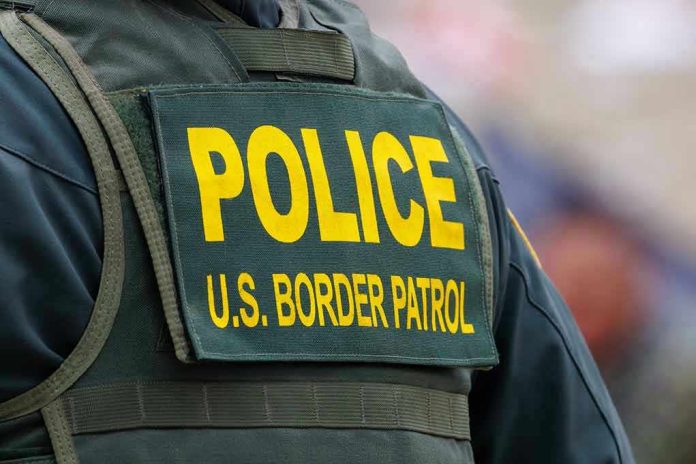
When federal agents stormed California farms in July, it wasn’t just undocumented workers who felt the impact—America’s constitutional order and public trust took another blow, exposing the political fault lines that define our times.
At a Glance
- Over 300 suspected undocumented immigrants arrested in massive ICE raids at California cannabis farms
- Violent protests erupted, resulting in injuries, one farmworker fatality, and federal agents attacked with rocks and bricks
- Governor Newsom and state officials condemned the raids, escalating legal and political conflict with the Trump administration
- Epstein fallout created infighting among Trump loyalists, with threats of resignation and accusations of cover-ups
ICE Raids Ignite Chaos and Constitutional Fury in California
Federal immigration enforcement descended on southern California’s agricultural heartland on July 10, 2025, with ICE and CBP agents arresting over 300 individuals at cannabis farms in Camarillo and Carpinteria. These weren’t ordinary workplace inspections. Federal agents swept through the greenhouses, detaining suspected undocumented immigrants, including at least ten children—some unaccompanied, some allegedly forced into labor. The operation quickly devolved into chaos as protesters gathered, hurling rocks, bricks, and—reportedly—gunfire at law enforcement, prompting feds to deploy tear gas and smoke bombs. In the mayhem, a farmworker tragically fell from a greenhouse roof while trying to flee, later dying from injuries sustained in the fall. Several protesters, all U.S. citizens, were arrested for assaulting officers. The United Farm Workers union and state officials swiftly condemned the raids as violent and inhumane, igniting a firestorm of criticism from California’s political establishment and labor advocates.
Federal authorities justified the operation by citing suspected child labor and human trafficking at the sites—claims that stoked further outrage and skepticism about the true motives behind the crackdown. With the Trump administration setting ambitious new targets—one million deportations a year, expedited removals nationwide, and ICE empowered to operate in previously “sensitive” locations—it’s no surprise that California, a self-declared sanctuary, erupted in protest. The state’s officials, led by Governor Gavin Newsom, condemned the raids, blaming Trump’s policies for chaos, trauma, and the ever-widening chasm between federal enforcers and local communities.
California’s Leadership Doubles Down Against Federal Crackdown
California’s response was as swift as it was predictable. Governor Newsom, Los Angeles Mayor Karen Bass, and other state leaders lined up to accuse the Trump administration—and particularly Deputy Chief of Staff Stephen Miller—of targeting immigrant families and sowing fear for political gain. They labeled the raids “inhumane” and an assault on the state’s autonomy, with some local officials openly calling for resistance against federal law enforcement. The United Farm Workers union amplified these claims, warning of a chilling effect across California’s agricultural sector, disruption to vital food production, and deepening trauma for immigrant families already living under a cloud of fear.
This isn’t a new script for California, a state renowned for its legal battles against Trump-era federal policies. Within hours, Attorney General Rob Bonta announced fresh lawsuits challenging the raids and the administration’s aggressive enforcement tactics. The state’s political leadership continues to position itself as a shield for undocumented immigrants, refusing to cooperate with federal authorities and pledging to fight what they see as unconstitutional overreach. Yet, for many Americans, these actions look less like principled resistance and more like open defiance of federal law—and an outright invitation for chaos. When states turn their backs on the rule of law, is it any wonder that order disintegrates?
Epstein Fallout Shakes Trump’s Inner Circle and Fuels MAGA Rifts
The chaos in California wasn’t the only fire burning. As the dust settled on the ICE raids, President Trump and Attorney General Pam Bondi found themselves on the defensive over the long-festering Jeffrey Epstein scandal. After Bondi declared the case closed—insisting there was no evidence of murder, blackmail, or a “client list” of powerful men—the MAGA base erupted. Accusations of a cover-up flew fast and furious, with high-profile Trump allies like FBI Deputy Director Dan Bongino and Director Kash Patel threatening resignation. The controversy exposed deep fractures inside the administration and among Trump’s most loyal supporters, with public infighting and finger-pointing dominating headlines.
President Trump, never one to back down from a fight, publicly defended Bondi and blasted critics for fueling “distractions” at a time when the administration was waging war on illegal immigration and government corruption. Yet, the spectacle of MAGA-on-MAGA warfare over Epstein’s legacy highlights a simple truth: when transparency and accountability are in short supply, even the most loyal movement can crack under the weight of suspicion. For those of us who’ve watched years of bureaucratic dodges, government secrecy, and political gamesmanship, the irony is bitter—but not surprising.
Federal-State Battle Lines Harden as Public Trust Erodes
The July 2025 ICE raids and the Epstein fallout lay bare the country’s deepening polarization. California is digging in for a long legal and political war with Washington, gambling state resources and credibility on a strategy of permanent resistance. The Trump administration, meanwhile, is doubling down on promises to end sanctuary policies, ramp up deportations, and restore what it calls “law and order”—even as it faces dissent within its own ranks.
At the heart of this standoff is a question that should trouble every American: What happens when elected leaders—on both sides—prefer confrontation over cooperation, and politics over principle? The answer, as we’ve seen this summer, is chaos on the ground, violence in the streets, and a body politic that grows more cynical and divided by the day. For those who still believe in the Constitution, in the rule of law, and in the promise of equal justice for citizens before anyone else, the events of July 2025 are a clarion call: If we don’t demand accountability—at every level—there won’t be much left to conserve.




